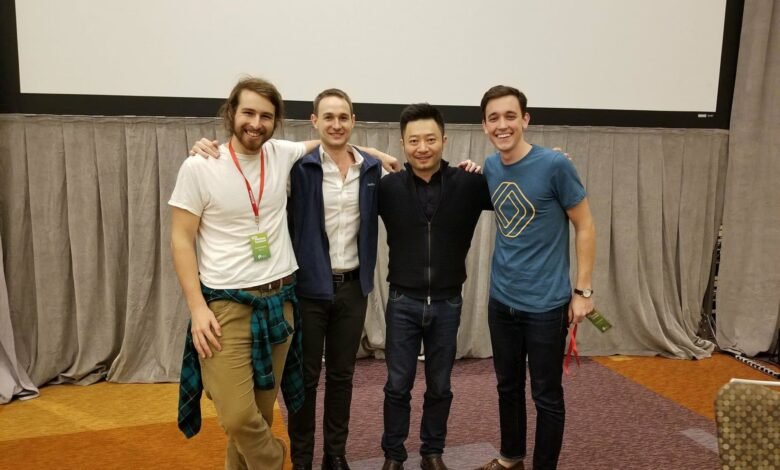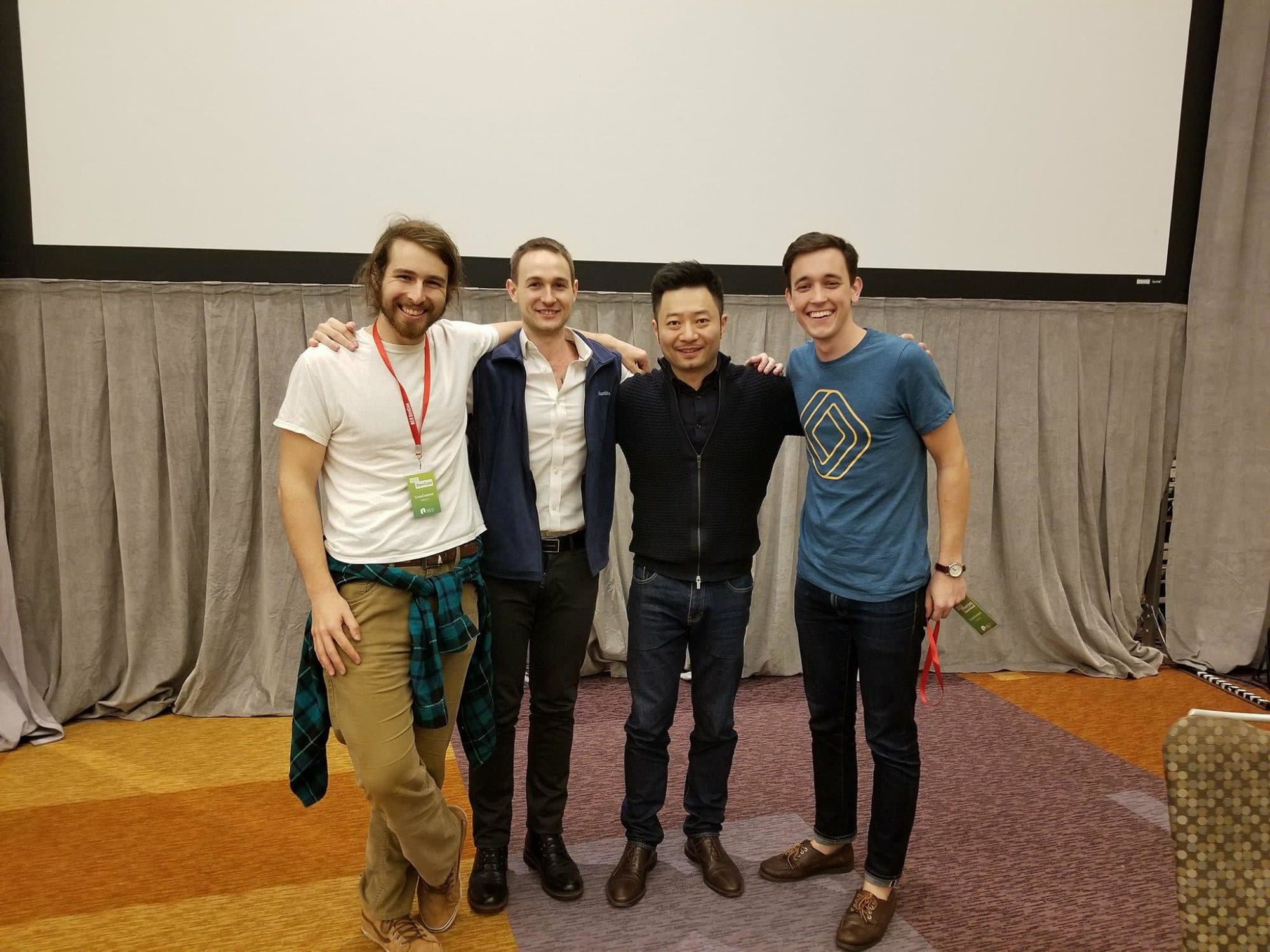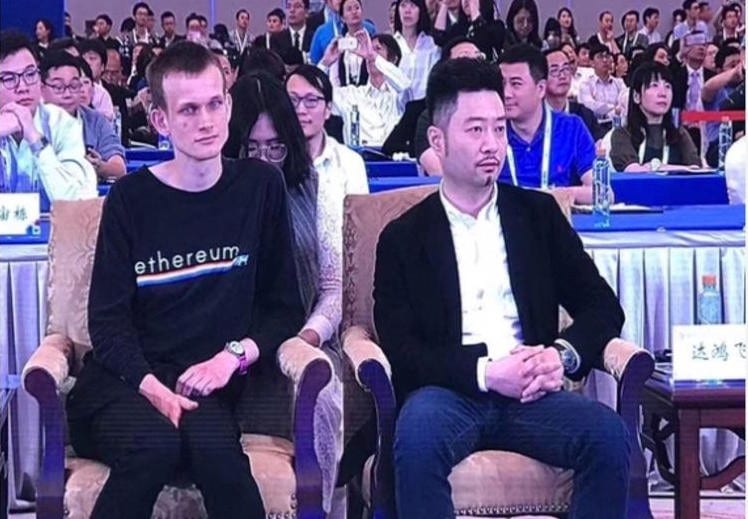Da Hongfei on NEO’s Future and the Cryptocurrency World

Da Hongfei is the founder of NEO (formerly known as Antshares), a blockchain platform for distributed apps. He is also the founder and CEO of Onchain, a blockchain development company for enterprise-level companies and institutions.
Hongfei is widely regarded as one of the principal figures in the cryptocurrency world, especially on the subject of blockchain adoption in China.
Behind his amicable personality and candid jokes of his chubby and humble early cryptocurrency days is one of the key strategists behind a cryptocurrency with an all-time-high market cap of over $10.5 billion and a burgeoning ecosystem of entrepreneurs and developers.
Alex Moskov, Colin Harper, and Bennett Garner conducted the following interview with Da Hongfei at NEO DevCon. We discuss several topics concerning Hongfei’s vision for NEO and the cryptocurrency world at large and ask a few questions concerning the psyche of the man at the helm of a multi-billion dollar movement and technological revolution.

CoinCentral: The focus of this conference is on NEO’s vision and the community initiative and trying to foster a robust ecosystem. NEO seems to be very careful about its ICO partnerships and its partnerships in general. Can you go into what goes into the NEO team’s mind when they’re vetting a project and deciding to back it? What makes you think, “This is a good project.
Hongfei: At this very early stage, we’re not very selective. We’ll check their background and look at that vision. Most projects that approach us are legit projects, so we don’t have a very strict standard of whether to support them or not. We’re gradually becoming more selective, though.
Could you comment on your personal psychology in overseeing the entire NEO ecosystem? What does a day in the life inside Da Hongfei’s head look like?
Things just happen. Sometimes, you’re pushed to do things, so it’s not like I’m planning for everything. The cryptoworld is 24/7. When I wake up, I grab my phone, and there are maybe 200 messages on my WeChat that I have to check. It’s not that I’m doing everyone’s jobs, but people will come to me for decisions. If you see enough things, you will have a better understanding of this industry and its direction.
Earlier this month, you did an interview with Bloomberg. In that interview, you said that you thought regulation was a good thing and you’ve said that previously as well. What are your thoughts on US and EU regulations? If you were making the rules, what would you like to see in those markets?
That’s a tough question. I think everything comes down to exchange. Speculation is a regulated business in most countries; you cannot run a centralized exchange freely. So, if a country wanted to regulate cryptocurrency or a token, the best way to do it would be to regulate the exchange.
Specifically, Fiat gateways or just in general?
Even token to token exchange is speculation, yes. There are two ways to make a fortune. One way is to create value, the other way is to divide value. Speculation is a zero-sum game. It’s not about creating something, it’s about how many I should have and how many are left to you. If everyone’s doing speculation, that means no one is creating new values. Human nature likes to do speculation and that’s why I believe speculation is regulated in almost every country.
Speaking of speculation, people really like Tether because it keeps their investment from fluctuating in the market. Tether has seen a lot of pushback from some community members and they’re skeptical of it. Do you have any comments on Tether and their current situation with the Bitfinex audit?
Tether is very much like the old goldsmiths from ancient times. They would give you a paper that says you have a certain amount of gold that is stored in his vaults. Gradually, those goldsmiths found out they could print more papers then the actual reserve. It’s even safe to do that if you do it modestly, and that becomes a fractional reserve system. I think that Tether will go the same direction. I’m not accusing them of doing it right now, I’m just thinking that it’s the direction of their kind of business. Even if they don’t have 100% reserve, as long as it is heavily used in exchanges, people will still use it. If we somehow find out that Tether only has 95% reserve, will the price drop to 95 cents? I don’t think so. I think the price will remain similar to $1.00. Gradually, it will become a fractional reserve system. It’s not because they’re morally bad, it’s just the nature of the business.
Let me add, the reason why I say this is because recently, I visited an exchange and I asked the CEO why is he still accepting USDT if Tether is dangerous? His answer was that it was widely used by every major exchange. Even if they have zero dollars in the bank, all the exchanges won’t let Tether die. They will honor Tether. That’s the reason why he decided to continue to use USDT. He said that even if Tether as a company goes bankrupt, he will honor his user’s USDT with USD. As long as it has been widely used, it’s difficult to be dead.
When the Weiss rating came out, there were a lot of other tokens that were listed with a similar rating and they’re also really good projects. Outside of NEO, what are some projects that you really like?
I think EOS and Cosmos are doing great. I’ve met Jed McCaleb at Stellar; he’s doing great things.
We very much enjoyed a lot of the speakers that you brought in like Zhang Shoucheng, the Stanford physics professor who talked about money as a storage of energy. It seems that he’s also fairly involved in the NEO ecosystem. What are some things that you look for partners to be involved with NEO?
We’re very open to having academics and industry leaders work with us, make friends with us, or contribute to our project in some way. We set up a foundation called the Open Blockchain Foundation, registered in California. This foundation will donate to universities and support research grants. It will also support student organizations in the blockchain area.
One thing that is clear from me from your comments and from the speakers that we heard here is that NEO is playing the long game for development. We know you took several years before you even launched Antshares and to study the space. Can you talk a little about patience and the importance of patience when trying to build something like a platform?
There is a very famous saying in China where when there is a wind, even the pig can fly. That applies to this industry too.
The problem is that if you are always chasing the direction of the wind, it’s really difficult. What we did is we find a place and think it looks nice, the scenery there is nice, and we’d love to stay there and do our work, and suddenly, the wind comes. That’s our patience. We’re not doing it because it’s so popular. Back in 2014, it wasn’t popular, it was very controversial. We do it because we love doing it.

That patience seems to have paid off. We’re seeing NEO break into the top 10 and we’re seeing it encroach onto the big players. It has often been dubbed the “Chinese Ethereum,” and the whole focus on the conference is NEO’s smart economy and NEO’s community. Do you think that calling it the “Chinese Ethereum” is fitting and in what ways do you feel NEO differs and how you’re setting yourself apart?
There are many Chinese companies being called “Chinese This” and “Chinese That”. Baidu, the search engine, is called the Chinese version of Google. There are some Chinese versions that become better than their counterparts in the Western world. WeChat is better and bigger than WhatsApp. Alibaba is on par with Amazon and it’s also pretty big. I don’t mind being called the “Chinese Ethereum” because it’s easier for people to understand what NEO is. With time, we’re improving, and we have better technology and an ecosystem. By that time, people will call us by our actual name.
When you were changing your name from Antshares to NEO, there was probably a meeting where you had other names floating around. What were some names that NEO was almost called that you were glad didn’t happen?
Basically, NEO is my idea. Antshares is derived from our Chinese name. The Chinese name translates to “Tiny Ant”. We can’t call us Tiny Ant because it’s weird and we can’t get the domain, so we needed something unique, so we came up with Antshares. It’s not a very natural English name though, and there are conflicts with other brands in China like Antfinancial, and an action camera competing with GoPro that has the exact same Chinese name as us. We decided to rebrand. I don’t remember the other names. I came up with NEO and then I pushed hard to my other team members. I wouldn’t say I forced them, but I tried pretty hard to persuade them. Not everyone thought we needed a new name as we were already quite famous in the Chinese market.
Were you ever a fan of the Matrix?
Yes. It’s a very intriguing movie. Our name NEO is not from the Matrix though.
What do you do for fun that’s not blockchain/crypto-related? What do you do to relax?
I watch MMA. I’ve been following UFC for about 15 years, quite early.
Will system fees be lowered in the future if the price of Gas continues to rise? If not, do you think this will hamper the ecosystem’s growth at all?
Ultimately, the system fee will be decided by NEO token holders. The NEO token is a stake in the system, so we will let the NEO token holders have the ability to decide how much system fees should be priced at. It’s not fixed forever. The token holders should decide a fee structure that is comparative to other blockchains.
Why an indivisible token and do you see this causing any sort of friction going forward as NEO continues to grow?
I think it’s an issue. Let’s put it this way. Every block will have eight Gas unlocked. The Gas is already there, it’s just inactive. There’s one Gas bound with one NEO token. Block after block, a small amount of the Gas will be unlocked. It’s not like you’re earning a dividend, it’s not a security. It’s like a gradual release of something you already own. The reason that NEO token is indivisible is that we want the release to be immediate. Every block, there will be eight Gas released and those Gas will be divided by the NEO token holders. If NEO is divisible, it will cause some mathematical problems. We are thinking about designing a new mechanism though. Under the new mechanism, the total amount of Gas is approximately 100 million, but not exactly 100 million. With that mechanism, NEO tokens can be divisible.
Last questions straight from the horse’s mouth on Reddit. Does Da Hongfei use any special lotions in the morning or is he naturally this beautiful?
Haha. My morning routine involves shaving 80% of the time. I have to maintain the shape of my beard.
To keep up with Da Hongfei and happenings in the NEO world, follow him and NEO on Twitter, as well as the NEO Discord channel.
Never Miss Another Opportunity! Get hand selected news & info from our Crypto Experts so you can make educated, informed decisions that directly affect your crypto profits. Subscribe to CoinCentral free newsletter now.





